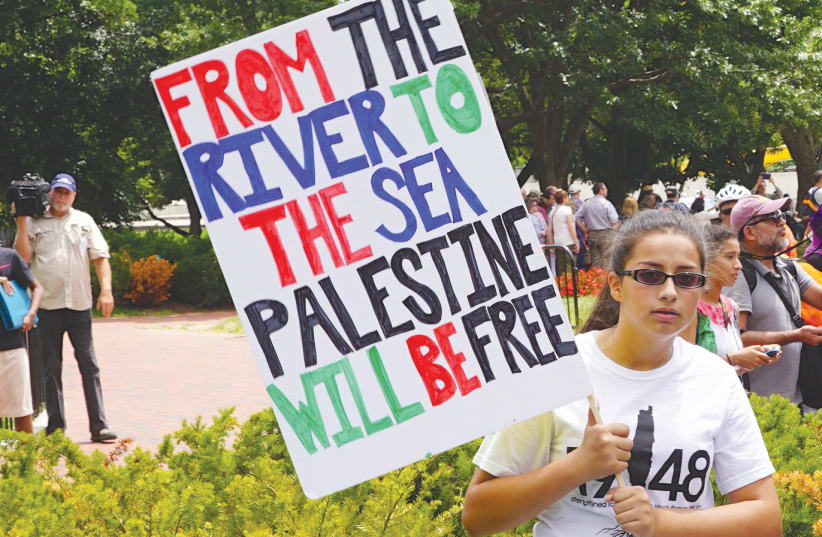The British Broadcasting Corporation (BBC) should take “every possible step” to ensure that nothing like its manipulation of the Princess of Wales to secure an interview ever happens again, British Prime Minister Boris Johnson recently said.
Indeed, the firestorm of controversy surrounding Princess Diana’s notorious 1995 BBC appearance resulted in an inquiry that found that the corporation had covered up “deceitful behavior.”
The BBC accepted the findings of the report in full, and announced that it would be conducting a thorough review of its editorial practices.
BBC Director General Tim Davie even took the extraordinary step of apologizing directly to Prince Charles for the “lurid and untrue claims” made during the interview about him, members of his staff and other members of the royal family.
But while the corporation ultimately demonstrated transparency in this case, its continued cover-up of an internal report revealing systematic editorial bias against Israel is the epitome of “deceitful behavior.”
The recent Israel-Hamas war seemingly confirmed what many have long suspected about the BBC’s coverage. For decades, the publicly-funded corporation has broadcast news and analysis overtly hostile to the Jewish state. This systemic bias by a media outlet viewed by over 400 million people every week has potentially contributed to and helped legitimize antisemitism.
Following HonestReporting’s uncovering of antisemitic tweets posted by journalist Tala Halawa, the corporation launched an investigation. On June 12, it announced that its Palestine Specialist for BBC Monitoring was fired from her job over messages she had posted prior to joining the outlet — including one that suggested “#Israel Is more #Nazi than #Hitler !”
But while the BBC should be commended for Halawa’s dismissal, the question remains: How did someone who tweeted “#HitlerWasRight” in the first place manage to land a job at one of the world’s premier news organizations?
In June 2020, Tim Davie became BBC director-general. In October, he presented new professional guidelines that require staff to avoid expressing their personal political views on their private social media accounts.
Davie has explicitly stated that the goal of his new policies is to reduce perceived bias at the BBC: “If you want to be an opinionated columnist or a partisan campaigner on social media then that is a valid choice, but you should not be working at the BBC,” he said.
Given Davie’s stated commitment to transparency and journalistic integrity, now would be an ideal time for the outlet to finally release the Balen Report about BBC’s reporting on the Israeli-Palestinian issue.
The report was commissioned by the BBC in 2004 to investigate allegations that its coverage of the Israeli-Palestinian issue was biased. More than 15 years later, the report has not been released to the public that funds the organization. In fact, the British Broadcasting Corporation has stood firm in the face of 400 Freedom of Information requests.
Why has the report been buried?
Malcolm Balen, then a senior editorial adviser at BBC, analyzed hundreds of hours of broadcast material, both on television and radio. He focused on such details as the words and phrases that journalists used in their reporting, as well as the background footage in stories related to the Israeli-Palestinian conflict.
Balen amalgamated his findings into a 20,000-word document. The results were apparently so damning that the BBC fought to keep the report from seeing the light of day. But tidbits leaked out, and the claims of anti-Israel bias were apparently confirmed.
In response, BBC executives ordered Balen’s report to be locked away. The corporation subsequently spent £333,000 ($500,000) to cover up Balen’s conclusions. The battle for full disclosure continued until 2012, when the British High Court unanimously dismissed the appeal of solicitor Steven Sugar, who had challenged the BBC under the Freedom of Information Act.
To date, Tim Davie has taken several steps to combat bias at the BBC.
For example, BBC World Service apologized for a “lapse of standards” after the broadcast of an uncritical interview with Palestinian terrorist Ahlam al-Tamimi, the mastermind of the 2001 suicide bombing of a pizzeria in the heart of Jerusalem that killed 15 people.
However, Arnold Roth, whose 15-year-old daughter Malki was murdered in the attack, said that the BBC’s apology for inviting Tamimi was “empty, cruel and pointless.” He said he was “stunned by the coldness of the BBC’s formalistic, paint-by-numbers reaction to the torrent of criticism they received from an enraged public.”
Roth also accused the BBC of having “misplaced its moral compass.”
Meanwhile, a record number of antisemitic incidents were recorded in the United Kingdom for the fourth year in a row. And on May 15, thousands of people in London participated in a protest, where many ‘pro-Palestinian’ demonstrators chanted about massacring Jews.
On May 16, multiple cars displaying Palestinian flags drove through Golders Green, a heavily Jewish-populated part of London. One individual shouted through a loudspeaker: “F–k the Jews, rape their daughters.”
The first step in combating overt antisemitism and anti-Israel bias is to acknowledge their existence – including at the BBC.
The writer is an editor at HonestReporting.
